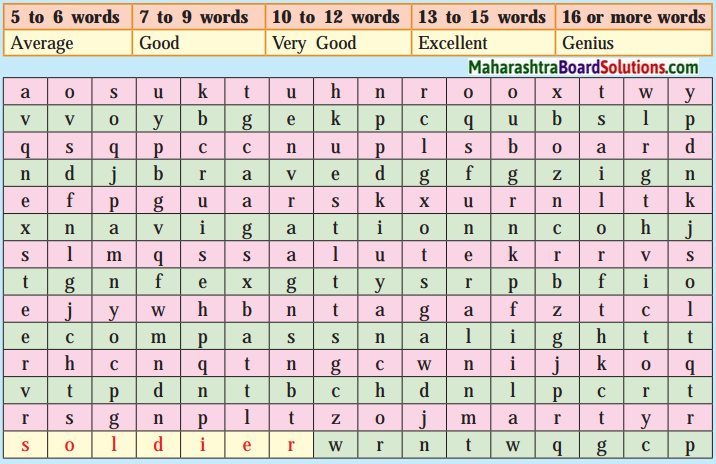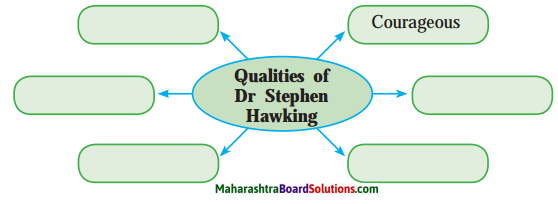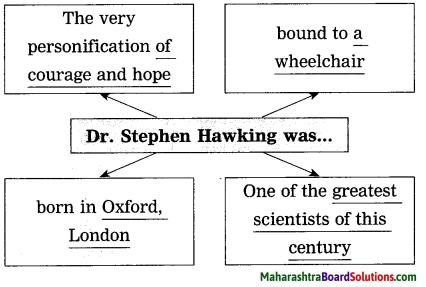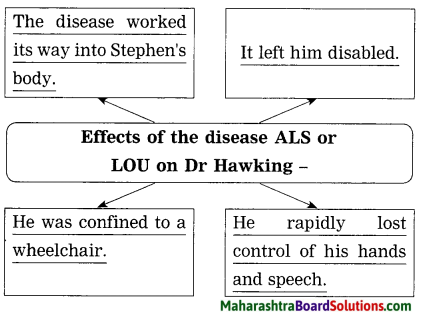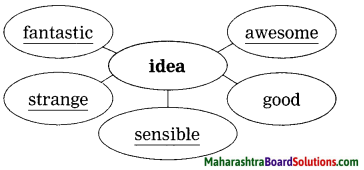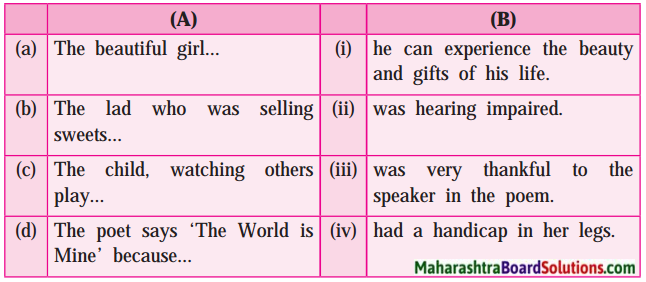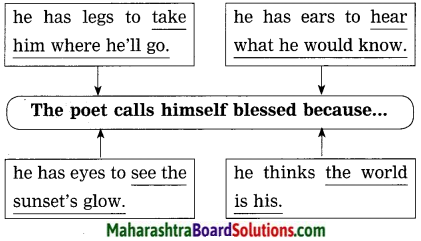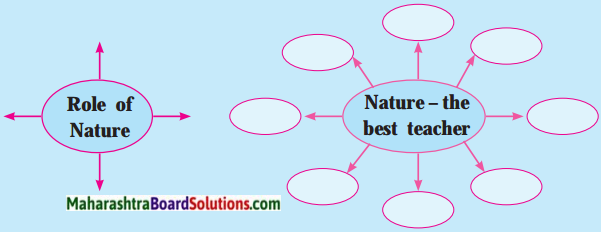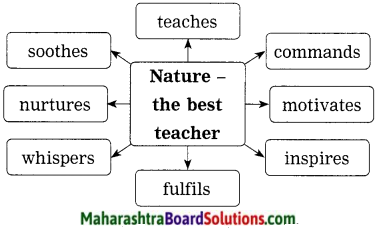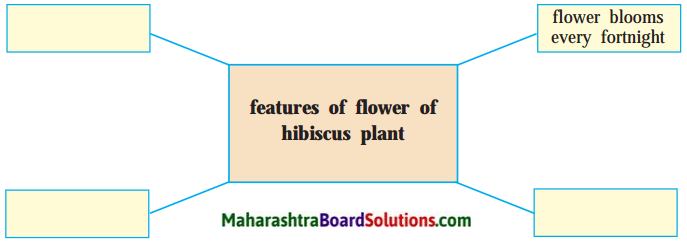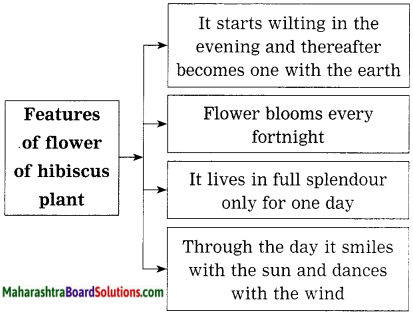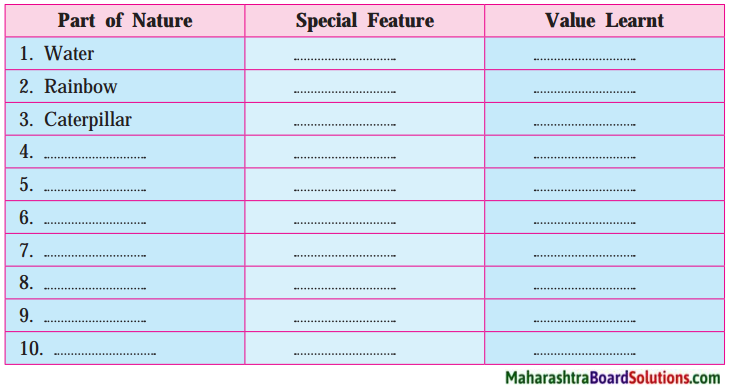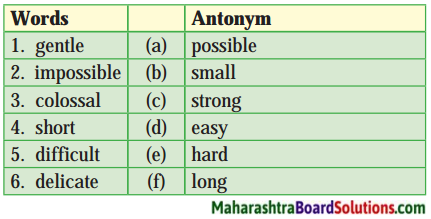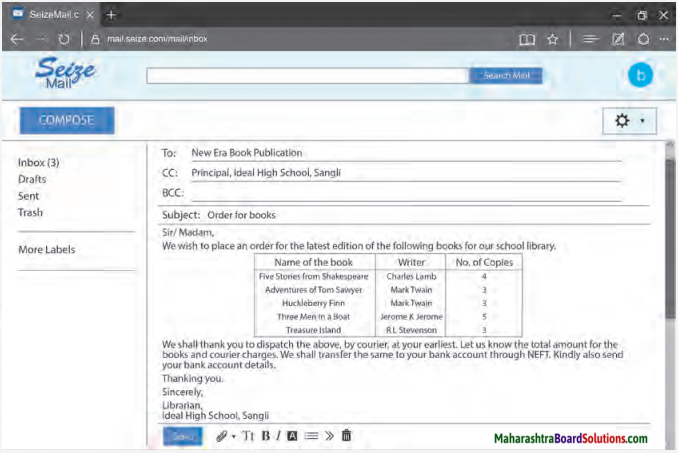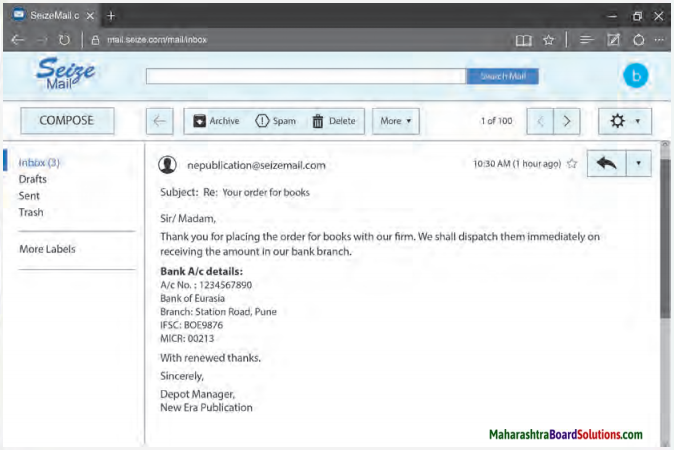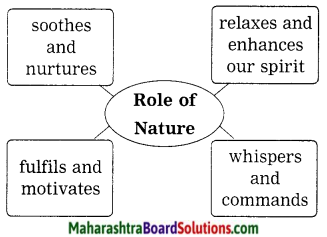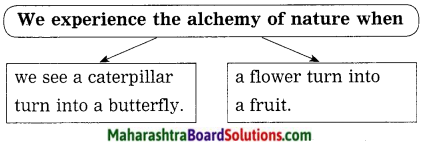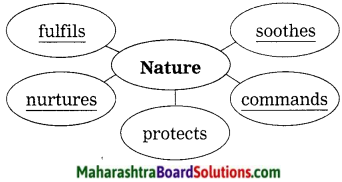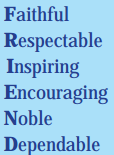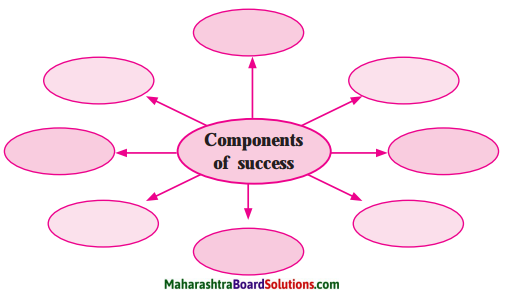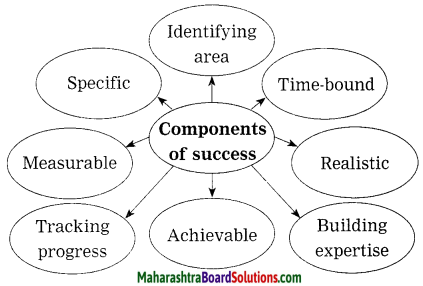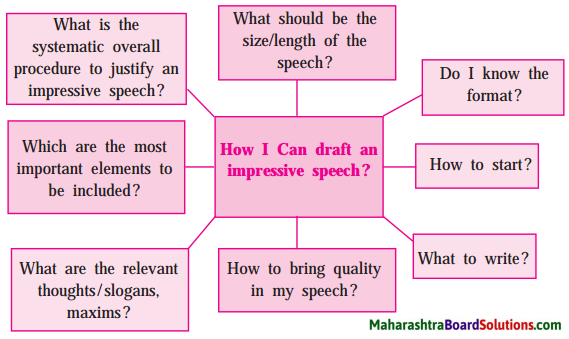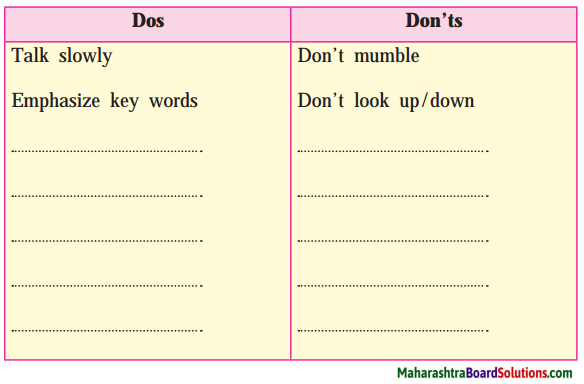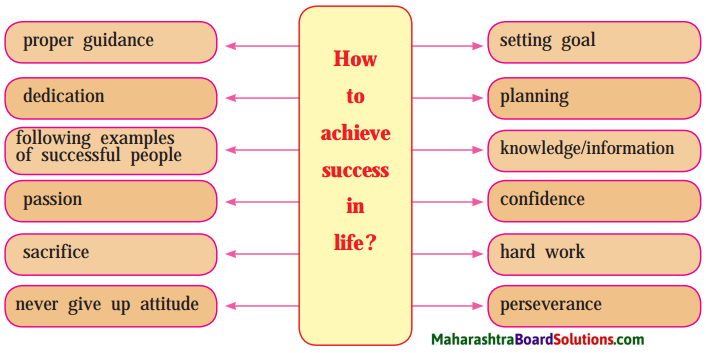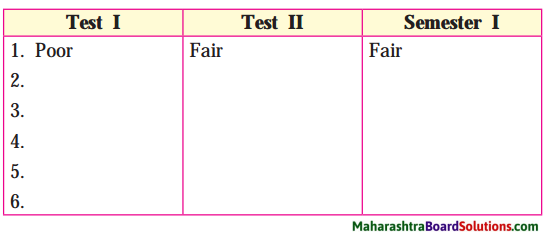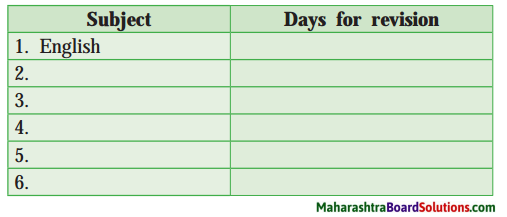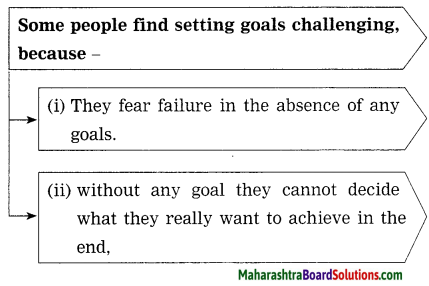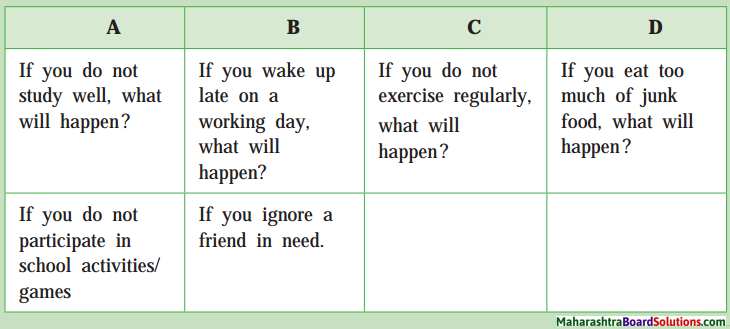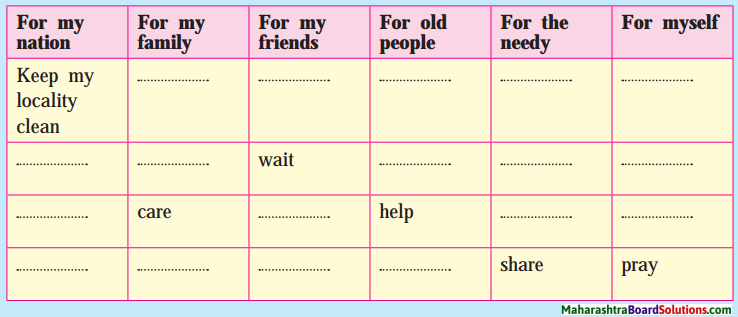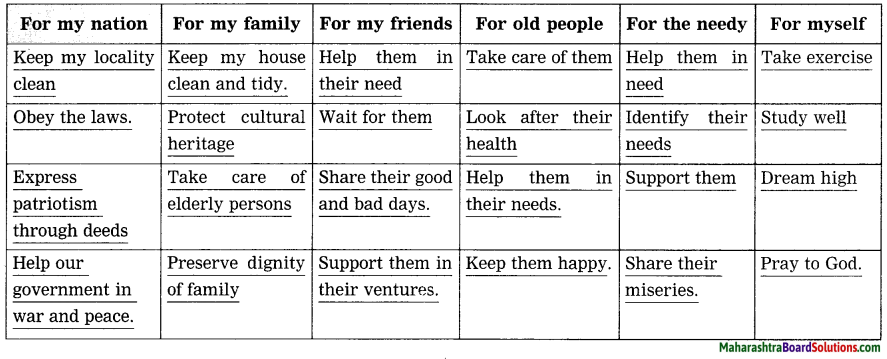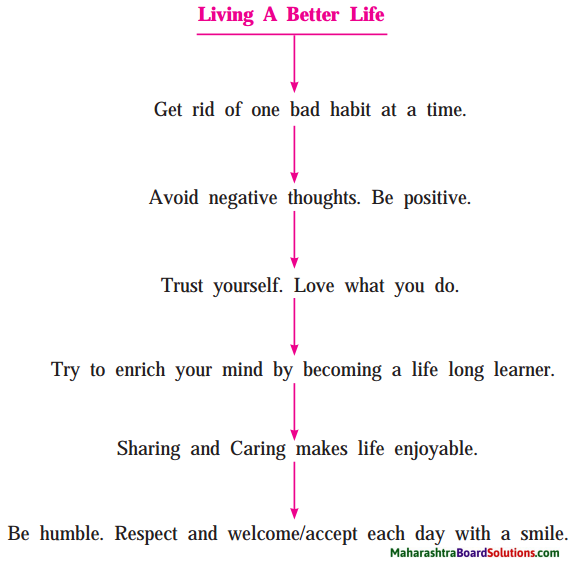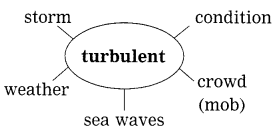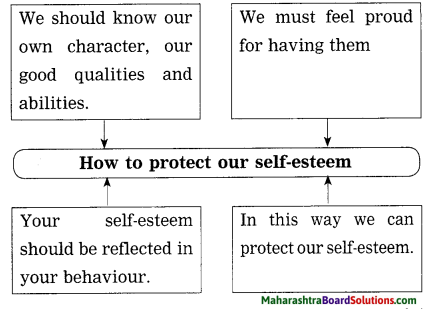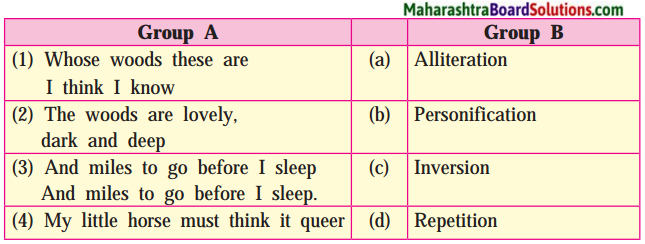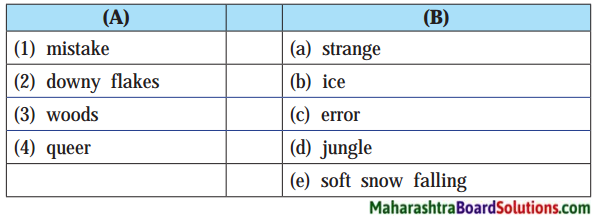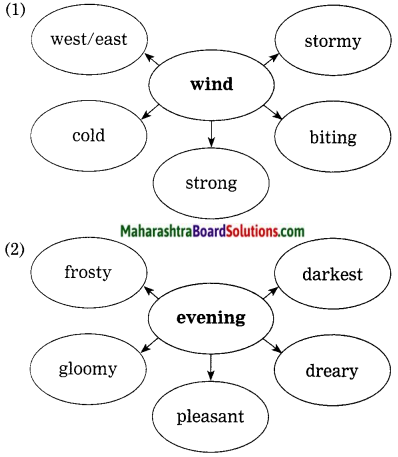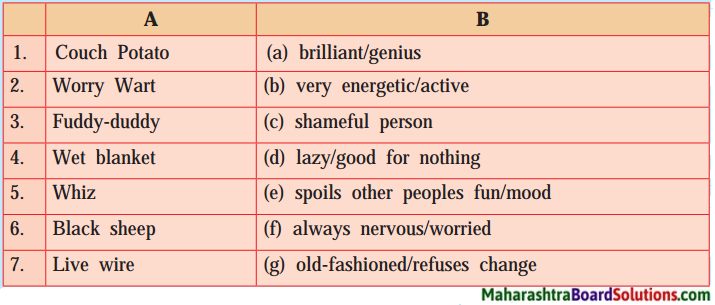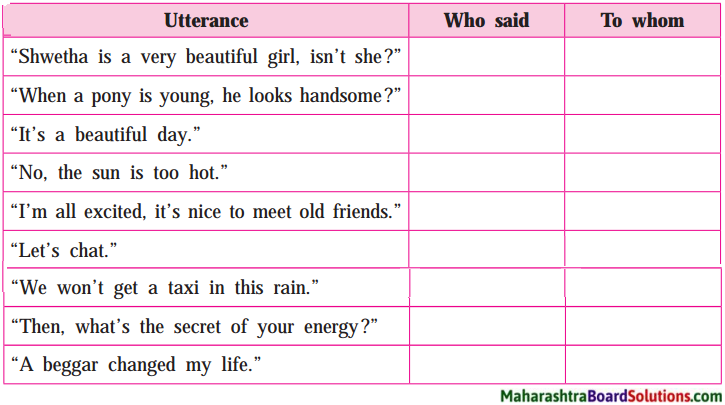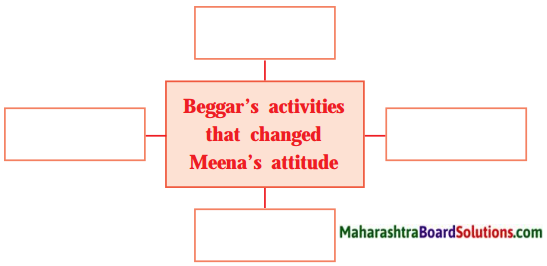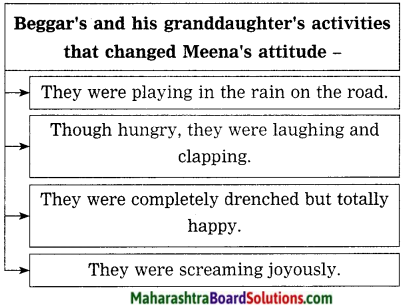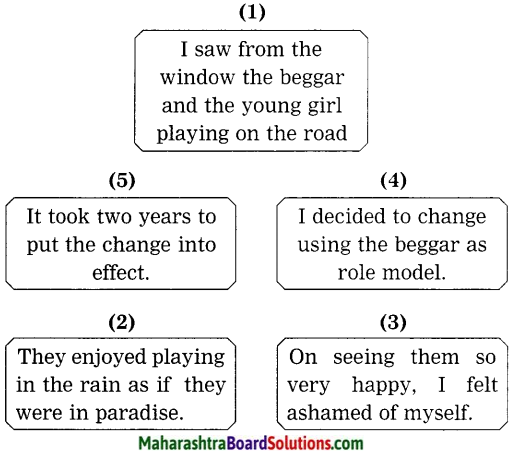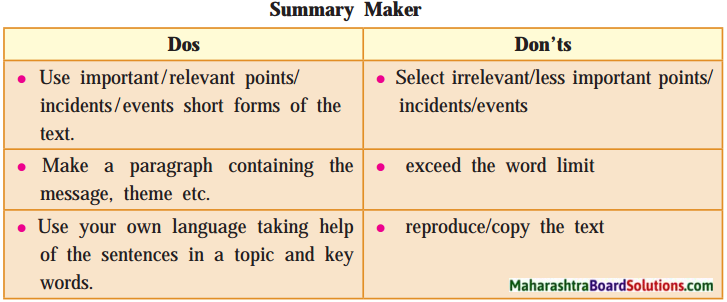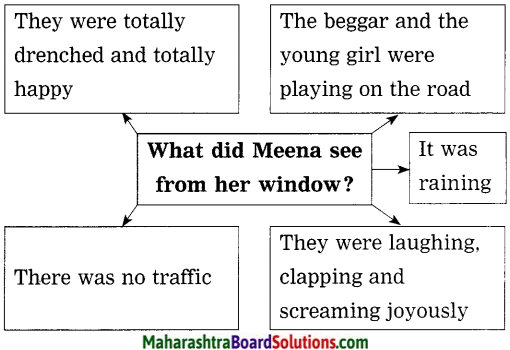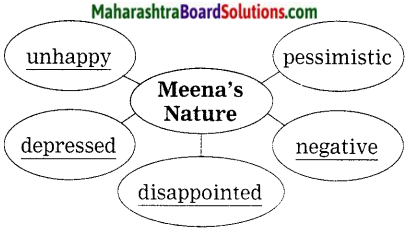Balbharti Maharashtra State Board Class 10 English Solutions My English Coursebook Chapter 2.2 The Boy who Broke The Bank Notes, Textbook Exercise Important Questions and Answers.
Maharashtra State Board Class 10 My English Coursebook Solutions Chapter 2.2 The Boy who Broke The Bank
My English Coursebook Standard Ten Guide Chapter 2.2 The Boy who Broke The Bank Textbook Questions and Answers
Warming up!
Chit-chat:
Question 1.
‘A lie can run round the world before truth has got its boots on.’ The above quotation expresses how fast rumours spread:
Talk with your group about some recent rumour, when people believed at first and suffered for it, later.
Answer:
There was a rumour recently in my locality, about a travel company that it was promising people a world tour at just ₹ 50,000. It had begun from a man’s misinterpretation of a newspaper advertisement, which stated that the company was offering a discount of ₹ 50,000. In no time, people were ready to book the tour for themselves.
They started contacting the company, in a rush, so that they didn’t miss the wonderful offer. On hearing the rumour, a conman thought of playing a trick. He claimed to be an employee of the company and started collecting money from people as advance. He even presented a fake Identity Card of himself, made fake bookings for the people and even gave them fake receipts for the payment they had made.
He took as many bookings as he could in a week and asked people to visit the company’s office in a week’s time to discuss further details. After a week, when people started showing up at the company’s office, they found out that the man never worked there and that the whole thing was a scam. More than 15 families fell victims to this scam and vowed never to believe in any such rumours again.

Question 2.
Discuss, how one can decide whether some news is a fact or fake.
Answer:
Points :
Find if it is reliable – believable – if it has any rational explanation – if it stands to your reason – or consider it fake and untrue – common sense can lead us to facts.
Question 3.
Who, do you think, are responsible for spreading fake news ?
Points :
Fake news are spread by some loafers or idle people or some mischief-makers – some spread false newsfor passing time – some justfor enjoying fun – some for taking revenge and harassing some targeted persons.
Question 4.
Do you believe in all the news you come across?
Points :
No – can use common sense – reasoning and its reliability.

Question 5.
Give one example of a rumour which seemed to be a fact in the beginning later it was proved false,
Answer:
SSC exams have been postponed for uncertain period. This news was not published by SSC Board.
2. Read the following statements. Describe whether they are facts or rumours. Justify your decision.
Question 1.
Read the following statements. Describe whether they are facts or rumours. Justify your decision.
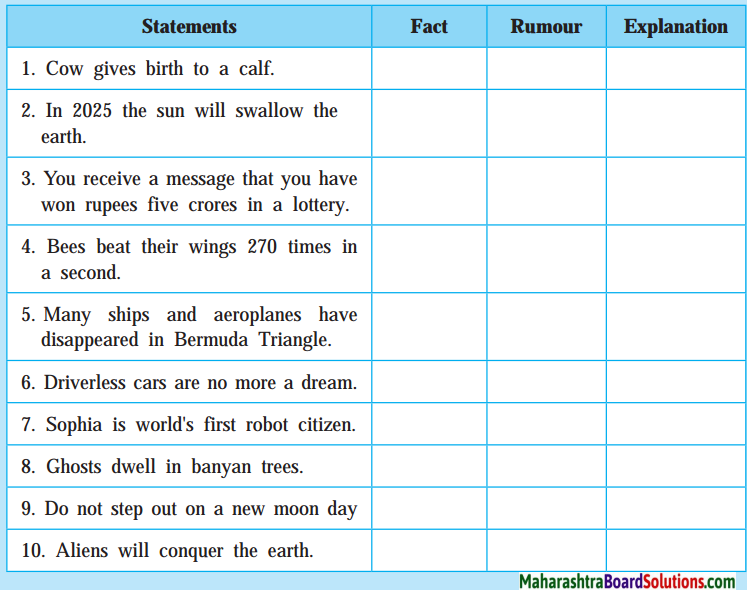
Answer:
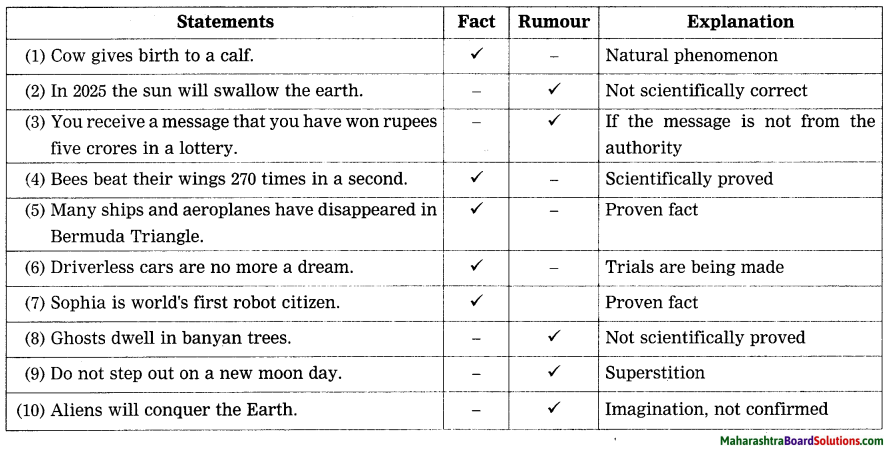

English Workshop:
1. Who am I? (Identify the character from the extract.)
Question 1.
Who am I? (Identify the character from the extract.)
(a) I am the washerman’s son. Who am I? Sitaram
(b) I am the owner of the bank, who am I? ……………..
(c) I am the sweeper, who am I? ………………
(d) I am the friend of Mrs. Srivastava, who am I? ……………..
(e) I am the hair dresser. Who am I?
(f) I have a crooked leg, who am I?
Answer:
(a) I am the washerman’s son. Who am I? – Sitaram
(b) I am the owner of the bank, who am I? – Seth Govind Ram
(c) I am the sweeper, who am I? – Nathu
(d) I am the friend of Mrs. Srivastava, who am I? – Mrs. Bhushan
(e) I am the hair dresser. Who am I? – Deep Chand
(f) I have a crooked leg, who am I? – The beggar Ganpat.
2. Make a list of customers of Pipalnagar Bank, from the extract.
Question 1.
Make a list of customers of Pipalnagar Bank, from the extract.
Answer:
- Betel-seller
- Tailor
- Free vendor
- Jeweller
- Beggar
- Deep Chand, the barber
- Elderly Gentleman
- Ganpat, the beggar

3. Match the following and write the complete meaningful sentences.
Question 1.
Match the following and write the complete meaningful sentences.
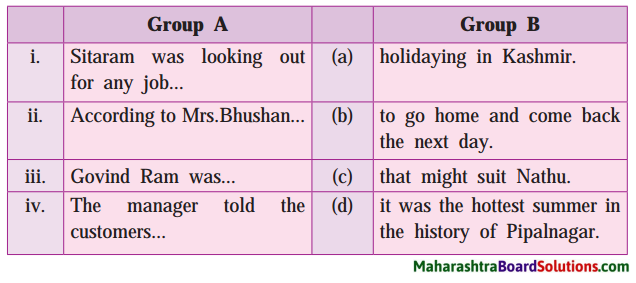
Answer:
| Group A | Group B |
| i. Sitaram was looking out for any job… | (a) that might suit Nathu. |
| ii. According to Mrs.Bhushan… | (b) it was the hottest summer in the history of Pipalnagar. |
| iii. Govind Ram was… | (c) holidaying in Kashmir |
| iv. The manager told the customers… | (d) to go home and come back the next day. |
4. Write who said to whom.
Question a.
“Don’t raise such dust!”
Answer:
Sitaram, the washerman’s son said this to Nathu, the sweeper.
Question b.
“Who would have thought the bank would collapse !“
Answer:
Nathu said this to himself.

Question c.
“Where did you disappear?”
Answer:
Mrs. Bhushan said this to her husband.
Question d.
“The bird has flown!”
Answer:
The elderly gentleman said to Deep Chand, the barber.
5. Why was the Manager of the Bank in a dilemma? Write down in 5 to 6 lines in your notebook.
Question 1.
Why was the Manager of the Bank in a dilemma? Write down in 5 to 6 lines in your notebook.
Answer:
- The news of the collapse of the bank spread through Pipalnagar like wildfire and people rushed to the bank to withdraw their money.
- By noon, the bank had exhausted all its ready cash.
- This put the manager of the bank in a dilemma because emergency funds could only be obtained from another bank that was thirty miles away and he wasn’t sure that he would be able to convince the crowd to wait that long.
- He was also worried because he had no way of contacting the owner of the bank, Seth Govind Ram, on his houseboat in Kashmir.

6. Cross out the odd man.
Question 1.
(a) sweeper, hooligan, beggar, declare, locker
(b) hurriedly, carelessly, salary, definitely, suddenly
(c) imminent, latest, pavement, awful, shocking
(d) morning, scattering, raising, collecting, shouting
Answer:
(a) sweeper, hooligan, beggar, declare, locker – declare
(b) hurriedly, carelessly, salary, definitely, suddenly – salary
(c) imminent, latest, pavement, awful, shocking – pavement
(d) morning, scattering, raising, collecting, shouting – morning
7. Find the describing words for the following from the text.
Question 1.
Find the describing words for the following from the text.
- …….. tour
- …….. shop
- …….. window
- …….. leg
Answer:
- customary tour
- photography shop
- plate glass window
- crooked leg

8. Complete the following table.
Question 1.
Complete the following table.

Answer:
| Verb | Noun | Adjectives | Adverb |
| pay | payment | payable | × |
| × | suddenness | sudden | suddenly |
| declare | declaration | declarable | × |
| cheer | cheer | cheerful | cheerfully |

9. Write in your own words a few sentences about each of the following :
(a) Nathu
(b) Mrs. Shrivastava
(c) Seth Govind Ram
(d) Sitaram
Question a.
Nathu
Answer:
Nathu: Nathu was a sweeper working with the Pipalnagar Bank, owned by Seth Govind Ram. He was annoyed because the Bank had not paid his salary though they were the last days of the month. He was sweeping hurriedly and carelessly because he was not happy with the owner. He was thinking of leaving that job.
Question b.
Mrs. Shrivastava
Answer:
Mrs Srivastava was Sitaram’s customer and was the lady of the house he visited. She gave some instructions to the ayah and the cook and then went the Pipalnagar market place, to make her usual tour of the cloth market. At one end of the bazaar she met her friend Mrs Bhushan. They both complained of the hot summer and they talked about a sample of cloth. Then Mrs Srivastava told Mrs Bhushan that Seth Govind Ram’s bank could not pay their sweeper for over a month. She seems to be very talkative lady and was the root cause of the rumour about Pipalnagar Bank.

Question c.
Seth Govind Ram
Answer:
Seth Govind Ram was the owner of the Pipalnagar Bank. A rumour was spread that the bank was about to go bankrupt. There was chaos among the people of Pipalnagar. Seth was holidaying in Kashmir and the manager of the Bank was in dilemma as he was unable to contact Seth Govind Ram who was on his houseboat in Kashmir. There were rumours about Seth’s absence in Pipalnagar.
Question d.
Sitaram
Answer:
Sitaram: Sitaram was a washerman’s son. He used to deliver freshly pressed clothes to every home. He plodded barefoot along the road to deliver a big bundle of clothes on his head. He was a helpful person. He was glad that he would be of service to both, a customer and his friend, Nathu.

10. Expand the theme in a write-up of about 20 lines.

Question a.
‘Rumours are spread by fools and accepted by greater fools’.
Answer:
‘Rumours are spread by fools and accepted by greater fools’ It is a common tendency of idle people or mischief-makers to spread rumours. These rumour-mongers themselves are fools. They spread some nasty, false news. They themselves do not know the truth or fact in the news. Many a times they have not heard or seen anything but repeat some story/news to people without believing it themselves.
A rumour is any talk, report or hearsay of doubtful nature or unverified statement or assertion. If we track such a rumour, we will find that it either is a falsehood, gossip or an exaggeration of the truth. So we can say that those who start spreading such rumours are fools. Every rumour suggests something more than it conveys and gives people uncomfortable sense of suspicion, mystery and sometimes dreadful traumas.
Some rumours are harmless though, they are spread by fools who intend to get joy and fun in doing so. Any kind of rumour does not stop at one place it goes from one person to another and one place to another. But greater fools are those who satisfy their natural tendency to believe what they want to believe and that also without going to the root of the news. People accept these rumours, add something to each and tell others and they go on nastier and nastier.
So responsibility, who accept the rumours, is greater. Not only gullible, ignorant people fall prey to rumours but also some educated, knowledgeable persons believe them because at that moment they do not use their reason and common sense or rational explanation and then suffer themselves. These people are greater fools because they never care to examine if that particular rumour is reliable, true or if it can stand to their reason.
Before you accept any such rumour be sure it is a fact, nothing untrue and unreliable in it. Or you will have to face unpleasant memories and experiences. So keep away from rumours.

Question b.
‘Books are our real friends’
Answer:
Books are our real friends Books are our never-failing friends. They have their own value. As we need food for our body so we need books for our mind. They are our closest friends who give us precious wealth of knowledge and experience. They deal with various subjects in the world and on every aspect of our life. They are the world of treasures.
The books entertain us, advise us and give comfort and contentment to our soul and most importantly they impart wisdom that helps us throughout our life. They help you in your sufferings, depression and soothe your soul. They give you company when you are alone.
They are your real companions. Making friendship with books itself is a blessing. They take us to the journey into the beautiful world and help you to achieve your success like your true best friends. Good books also teach you the qualities that last long in your life. They give you confidence and courage to speak, to improve your language skills and develop your personality.
They accompany you in painful struggles, difficulties and bad days. They also help you to avoid your mistakes, flaws, teaching you wise conduct and wise tolerance towards others.
The books influence you forever and make you a gentle and knowledgeable person.
So, borrow books, buy books, preserve them and make friends with them as your true, real friends!
11. Project: Collect the names of books written by Ruskin Bond.
Question 1.
Collect the names of books written by Ruskin Bond.
Answer:
The names of books written by Ruskin Bond.
The Room of the Roof, Blue Umbrella, The Night Train at Deoli, Rusty, the Boy from the Hills, Road to Musoorie, Tales and Legends from India, Our Trees still Grow in Dehra, The India I love, Maharani, The Flight of Pigeons, Dust of the Mountain, The Book of Simple Living, The Kitemakers, All Roads Lead to Ganga, A Season of Ghosts, Vagrants in the Valley, etc.

Language Study:
1. I know of a sweeper boy who’s looking for work.
Observe the underlined part of the sentence. It tells us more about the sweeper boy. An adjective clause begins with words such as how, that, what, whatever, who, which, where, why etc.
Now, complete the sentences given below using your own adjective clauses.
- I know of a school boy …………………………….. .
- I know the joke …………………………….. .
- I know of a doctor ……………………………… .
- I know of a place ………………………………. .
- I know the reason …………………………….. .
Question 1.
Complete the sentences given below using your own adjective clauses :
- I know of a school boy …………………………….. .
- I know the joke …………………………….. .
- I know of a doctor ……………………………… .
- I know of a place ………………………………. .
- I know the reason …………………………….. .
Answer:
- I know of a school boy who is expert in horse riding.
- I know the joke that will split your sides with laughter.
- I know of a doctor who is hard of hearing.
- I know of a place where people crave for . bull-fights.
- I know the reason why the girl is always gloomy in the class.
2. Rewrite the following sentences joining them with ‘when’, where’, ‘which’, ‘why’.
Question a.
Sitaram had a bundle of freshly pressed clothes. He balanced it on his head.
Answer:
Sitaram had a bundle of freshly pressed clothes which he balanced on his head.

Question b.
A large shady tamarind tree grew at one end of the bazaar. Mrs. Srivastava found her friend Mrs. Bhushan there.
Answer:
Mrs Srivastava found her friend Mrs Bhushan where a large shady tamarind tree grew at one end of the bazaar.
Question c.
The Pipalnagar Bank has stopped paying employees. It is about to collapse.
Answer:
Pipalnagar bank which is about to collapse, has stopped paying his employees.

Question d.
He had finished his work. He sat down on the highest step.
Answer:
He sat down on the highest step when he had finished his work.
My English Coursebook 10th Digest Chapter 2.2 The Boy who Broke The Bank Additional Important Questions and Answers
Read the following passage and do the activities:
Simple Factual Activities:
Question 1.
Who am I? (Identify the character)
Answer:
I am the place where you can deposit and withdraw money. – Bank
Question 2.
Complete the sentences using the information from the passage:
(Answers are directly given and underlined.)
Answer:
- Sitaram was looking out for any job that might suit Nathu.
- The lady of the house was in need of a sweeper.
- Sitaram talked to Mrs Srivastava about Nathu.

Question 3.
Who said to whom:
Question a.
‘Well, I wish you luck.’
Answer:
Sitaram said to Nathu.
Question b.
“But you go from one shop to another.”
Answer:
Mr Bhushan said this to his wife.
Question c.
“We want it now!”
Answer:
Some of the crowd said to the manager.
Question 4.
Complete the sentences using the information from the passage:
(Answers are directly given and underlined.)
Answer:
- Mr Srivastava was talking to Kamal Kishore the owner of the photography shop.
- Sitaram was glad that he had been of service to both a customer and his friend.
- According to Mrs Bhushan, it was the hottest summer in the history of Pipalnagar.
- Mr Bhushan said to his wife, “You go from one shop to another, like a bee in a flower garden.”

Question 5.
Who am I? (Identify the characters).
Answer:
- I am the owner of the photography shop. – Kamal Kishore
- I am the friend of Mrs Srivastava – Mrs Bhushan
Question 6.
Who am I? (Identify the characters)
Answer:
I sell betels. – betel seller
Question 7.
Who said to whom?
Question a.
‘The Pipalnagar Bank is about to collapse.’
Answer:
Kamal Kishore said this to Deep Chand.

Question 8.
Complete the following sentences using the information from the passage:
(Answers are directly given and underlined.)
Answer:
- Govind Ram was holidaying in Kashmir.
- The rumour about collapse of the Pipalnagar Bank spread through the bazaar with the rapidity of forest fire.
- The photography shop was just next to the barber shop.
- The elderly gentleman ran out of the barber’s shop and made a beeline for his office and chequebook.
- The elderly gentleman called a bird to Seth Govind Ram.
Question 9.
Complete the following sentences with the information given in the passage:
(Answers are directly given and underlined.)
Answer:
- The man with crooked leg was old Ganpat, the beggar.
- Someone said that the Seth had hanged himself from the tamarind tree.
- Ganpat ran to the Bank speedily to withdraw his one thousand rupees from the bank.
- The crash of the Pipalnagar Bank set everyone talking and speculating and rushing about in a frenzy.

Question 10.
State whether the following statements are Rumours or Facts:
Answer:
- The manager told the customers to go home and come back next day. – Fact
- Nathu was disgusted to see the broken glass and stones cluttering the steps. – Fact
- Seth Govind Ram was hiding in a safe deposit locker. – Rumour
- The bank was going out of business. – Rumour
Question 11.
Who are the persons referred to in the following sentences:
1. He was the last person to know about the Pipalnagar Bank going bankrupt.
2. He was happy that he did not have a bank account in Pipalnagar Bank.
Answer:
1. Nathu, the sweeper
2. Sitaram, the washerman’s son.
Complex Factual Activities:
Question 1.
Arrange the following sentences as per their sequence occurred in the passage:
1. Nathu complained about his irregular pay.
2. Nathu used the small broom hurriedly.
3. Sitaram called out to Nathu.
4. Nathu grumbled as he swept the steps of the bank.
Answer:
4. Nathu grumbled as he swept the steps of the bank.
2. Nathu used the small broom hurriedly.
3. Sitaram called out to Nathu.
1. Nathu complained about his irregular pay.

Question 2.
Complete the web about Nathu’s annoyance.
(Answer is directly given.)
Answer:
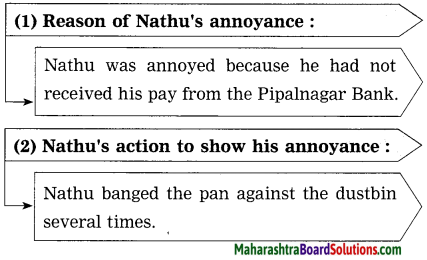
Question 3.
Complete the following web:
(Answer is directly given.)
Answer:

Question 4.
Complete the flow chart:
(Answers are directly given)
Answer:

Question 5.
How did the news spread everywhere?
Answer:
The news of the Bank’s collapse spread through the bazaar with the rapidity of fire. From Mr. Bhushan to Mr Kishore, Mr Kishore to the barber Deep Chand and the elderly gentleman and from there to the general merchant’s it travelled to the shop, circulated amongst the customers, then spread in various directions, to the betel-seller, the tailor, the free vendor, the jeweller, the beggar sitting on the pavement. It played havoc everywhere in Pipalnagar.

Question 6.
Complete the following sentences that tell you about Ganpat, the beggar:
(Answers are directly given and underlined.)
Answer:
- Ganpat was an old beggar who had a crooked leg.
- He had been squatting on the pavement for years.
- He never used to walk.
- When he learnt the collapse of the Bank, he leapt to his feet and ran at top speed in the direction of the Bank to withdraw his thousand rupees.
Question 7.
What was the effect of the rumour on the people of Pipalnagar?
Answer:
Men stood in groups at street corners and started discussing about the situation. Everyone was talking and speculating and rushing about in a frenzy. Some congratulated themselves for already taking out their money or never having put their money in the Bank. Some speculated that Seth Govind Ram’s excessive indulgence was the reason of crash.
Question 8.
What were the four rumours about Seth Govind Ram?
Answer:
The four rumours about Seth Govind Ram were as follows
- The Seth had fled the State.
- He had fled the country.
- He was hiding in Pipalnagar.
- He had hanged himself from the tamarind tree.

Question 9.
Complete the web: (Answer is directly given.)
Answer:
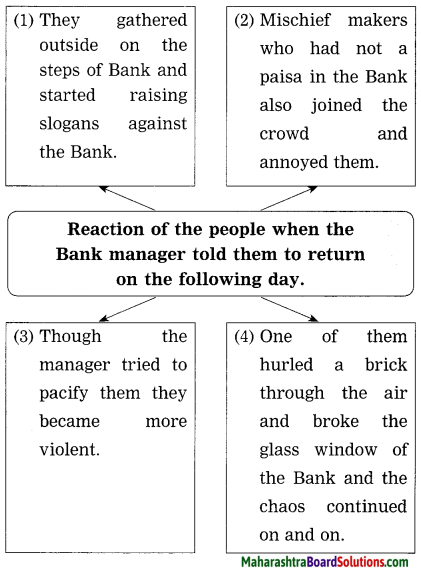
Activities based on Vocabulary:
Question 1.
Match the describing words with the nouns:
| Column ‘A’ | Column ‘B’ |
| 1. small | (a) man |
| 2. pressed | (b) pay |
| 3. regular | (c) clothes |
| 4. poor | (d) broom |
Answer:
| Column ‘A’ | Column ‘B’ |
| 1. small | (d) broom |
| 2. pressed | (c) clothes |
| 3. regular | (b) pay |
| 4. poor | (a) man |

Question 2.
Find the describing words for the following from the passage:
- rupees
- home
- week
Answer:
- extra two rupees
- fourth home
- another week.
Question 3.
Find describing words for the following from the passage:
meal
tamarind tree
Answer:
midday meal
large shady tamarind tree
Question 4.
Complete the following table.
(Answer is directly given.)
Answer:
| Verb | Noun | Adjectives | Adverb |
| – | confidence | confident | confidently |
| affirm | affirmation | affirmative | affirmatively |
| grow | growth | growing | – |
| remark | remark | remarkable | remarkably |

Question 5.
Find the words from the passage that mean the following:
- usual
- raised to higher position
- stable
- without enough money to pay what you owe
Answer:
- customary
- hoisted
- stationary
- bankrupt
Question 6.
Make a list of customers of the Bank.:
Answer:
List of the customers: general merchant, customers of shops, betel-seller, the tailor, the free vendor, the jeweller, the beggar and many others.

Question 7.
Match the words in column ‘A’ with their meanings in Column ‘B’:
| Column ’A’ | Column ‘B’ |
| 1. awful | (a) the direct route |
| 2. nicked | (b) the act of happening quickly. |
| 3. beeline | (c) cut slightly |
| 4. rapidity of fire | (d) shocking |
Answer:
| Column ’A’ | Column ‘B’ |
| 1. awful | (d) shocking |
| 2. nicked | (c) cut slightly |
| 3. beeline | (a) the direct route |
| 4. rapidity of fire | (b) the act of happening quickly. |
Question 8.
Match the words in Column ‘A’ with their meanings in Column ‘B’:
| Column ‘A’ | Column ‘B’ |
| 1. squatting | (a) guessing |
| 2. frenzy | (b) difficult situation |
| 3. speculating | (c) wild excitement |
| 4. dilemma | (d) sitting on one’s heels |
Answer:
| Column ‘A’ | Column ‘B’ |
| 1. squatting | (d) sitting on one’s heels |
| 2. frenzy | (c) wild excitement |
| 3. speculating | (a) guessing |
| 4. dilemma | (b) difficult situation |

Question 9.
Find the describing words for the following from the passage:
- fund
- manager
- speed
Answer:
- emergency fund
- harassed manager
- top speed
Question 10.
Write one word for the following:
- a person who deliberately causes trouble to people.
- a person who washes clothes for other people.
- a person who behaves extremely noisy and violent way in public.
- a person who is in charge of the business of an organisation.
Answer:
- a mischief-maker
- a washerman
- a hooligan
- a manager

Question 11.
Find and write the infinitives with ‘to’ from the passage:
Answer:
- to return
- to placate
- to go
- to sweep
- to take up
- to be paid
- to claim
- to await
- to get.
Question 12.
Underline the odd man:
(Answers are directly given.)
Answer:
- washerman, mischief-maker, sweeper, counter, hooligan
- hurtled, cried, declared, gathered, joined
- their, our, his, they, your
- sound, locker, new, door, broom, bicycle

Activities based on Contextual Grammar:
Question 1.
He called out to Nathu.
(Rewrite the sentence in Past Continuous Tense.)
Answer:
He was calling out to Nathu.
Question 2.
Mrs Srivastava said, “Tell him to come and see me tomorrow.” (Change into indirect speech.)
Answer:
Mrs Srivastava told (asked) him to tell him: to come and see her the next day.
Question 3.
He swept the steps.
(Begin your sentence with ‘The steps …)
Answer:
The steps were swept by him.

Question 4.
Sitaram was on his delivery round.
(Choose the correct question tag)
(a) was he?
(b) didn’t he?
(c) wasn’t he?
Answer:
Sitaram was on his delivery round, wasn’t he?
Question 5.
Mrs Bhushan went in search of her husband. He was sitting in front of Kamal Kishore’s photography shop.
(Rewrite the sentence joining it with ‘who)
Answer:
Mrs Bhushan went in search of her husband who was sitting in front of Kamal Kishore’s photography shop.

Question 6.
That summer was the hottest in the history of Pipalnagar.
(Change the sentence into Positive Degree.)
Answer:
No other summer in the history of Pipalnagar was so hot as that.
Question 7.
‘Shocking!’ (Rewrite it as an assertive sentence.)
Answer:
It was really very shocking.
Question 8.
Rewrite the following sentences joining with when/where/which/why:
Question a.
He sped across the road to the general:
merchant’s store. There was a telephone there.
Answer:
He sped across the road to the general merchant’s store where there was a telephone.

Question 9.
Mr Kishore said, “Deep Chand, have you heard the latest?” (Change into indirect speech.)
Answer:
Mr Kishore asked Deep Chand if he had heard the latest.
Question 10.
The Seth was holidaying in Kashmir. (Frame a wh-question to get the underlined word as answer.)
Answer:
Where was the Seth holidaying?
Question 11.
I must know the reason. You are late.
(Join the sentence with the word ‘why’.)
Answer:
I must know why you are late.

Question 12.
He was hiding in Pipalnagar.
(Rewrite the sentence using Simple Present Tense.)
Answer:
He hides in Pipalnagar.
Question 13.
He wasn’t sure he could persuade the crowd.
(Add a question tag.)
Answer:
He wasn’t sure he could persuade the crowd, was he?
Personal Response:
Question 1.
What qualities do you find in Sitaram?
Answer:
Sitaram was a hardworking young boy. He ‘ was always ready to help others and sympathetic towards suffering people. He felt happy to serve his customer and his friend.

Question 2.
What makes you angry? What do you do then?
OR
How do you show your annoyance?
Answer:
Somebody’s bad behaviour or arrogance makes me angry. When I get annoyed I do not react with harsh words or any violent action. I try to keep myself cool and try to bring to his/her notice, the wrong he/she is doing with me. I shall take time: and prove him/her wrong.
Question 3.
Do you think, Mr Bhushan was right to compare his wife with a bee in a flower garden? Give your reason.
Answer:
Yes, I think Mr Bhushan was absolutely right to compare his wife with a bee in flower garden. We know that bees buzz from flower to flower in gardens for collecting honey. He knew that his wife similarly used to visit many shops for selecting her clothes or only to have a look at them.

Question 4.
Why, do you think, did the elderly gentleman rush to his office for a chequebook?
Answer:
The elderly gentleman had heard the rumour about Seth Govind Ram’s Bank. He thought that the Seth had gone broke and so he must have fled to another town. I think the gentleman ran for his chequebook because he wanted to withdraw all his money from the bank before it was declared bankrupt.
Question 5.
Have you ever heard a rumour that harmed people? Elaborate it.
Answer:
Yes, I have not only heard but also have experienced such a rumour that has harmed people. We had been to a theatre to watch a movie. It was the first show of the movie. In the middle of the show a person shouted ‘Fire! Fire!’. People in the theatre left their seats in fright and ran helter- skelter to the exits for safety. Many fell and were trampled underfoot in the rush. It was an awful scene. Truth came to light that the miscreant was an agent of a producer who wanted the movie to fail.
Question 6.
How are rumours spread? Are the rumours harmful? Why?/Why not?
Answer:
The rumour-mongers talk to some people about a news, which is not true. They talk to others and it goes from one person to another and spreads like forest fire. They generally don’t think if the news is reliable or rational or false. Some rumours are harmful and some are harmless. The rumours that are spread intentionally to harm the sentiments of people are harmful. These rumours depress, disturb and cause harassment to people. The rumours that are spread just for fun are harmless but they fool people.

Do as directed:
Question 1.
Nathu raised his hands in a gesture of horror. He cried. (Join the sentences beginning with the word ‘Raising’.)
Answer:
Raising his hand in a gesture of horror Nathu cried.
Question 2.
He was determined to get his pay.
(Change the sentence into exclamatory sentence.)
Answer:
How determined he was to get his pay!
Question 3.
Give us our money.
(Change the sentence in Passive Voice.)
Answer:
Let our money be given to us.

Question 4.
So, they gathered outside.
(Write the sentence in Present Continuous Tense.)
Answer:
So, they are gathering outside.
Question 5.
Complete the words by using the correct letters:
- r o _ n d
- t h i _ k
- p l _ t e
- s t _ r e
Answer:
- r o u n d
- t h i n k
- p l a t e
- s t o r e
Question 6.
Put the words in alphabetical order:
- shook, beggar, thousand, jeweller.
- soon, street, seldom, speculate.
Answer:
- beggar, jeweller, shook, thousand.
- seldom, soon, speculate, street.

Question 7.
Punctuate the following sentences:
1. fetch the Seth, we know hes hiding in a safe deposit locker
2. Do you know my dear that Seth govind Rams bank cant even pay its employees
Answer:
1. “Fetch the Seth, we know he’s hiding in a safe deposit locker!”
2. “Do you know, my dear, that Seth Govind Ram’s bank cant even pay its employees?”
Question 8.
Write related words as shown in the example:
(Answer is directly given and underlined.)
Answer:

Question 9.
Complete these word-chain of verbs:
tell → ………. → …………. → ………. → …………..
Answer:
tell → learn → need → dare → eat.

Do as directed:
1. Attempt any one:
Question a.
Make a meaningful sentence of your own using the phrase: to take up
Answer:
Recently he has taken up a new project in hand.
OR
Question b.
Add a clause to the following sentence to expand it meaningfully:
This is the answer – ………………..
Answer:
This is the answer that I was longing for.

2. Attempt anyone:
Question a.
Add a prefix or suffix to make new words:
1. possible
2. certain
Answer:
1. impossible
2. uncertain
OR
Question b.
Make a meaningful sentence using any one of the following words:
1. possible
2. certain
Answer:
1. It is not possible to do this work in such a short time.
2. The young boy was certain about his future career.
![]()
![]()
![]()
![]()
![]()
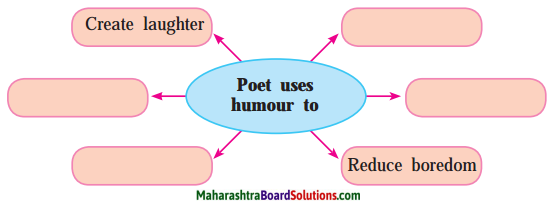
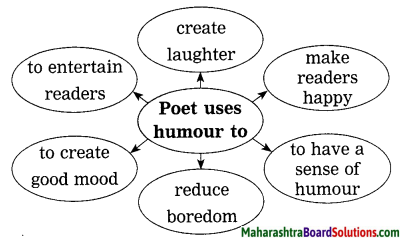
![]()
![]()
![]()
![]()
![]()
![]()
![]()
![]()

![]()
![]()
![]()
![]()
